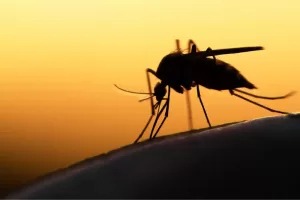Malaria- what is it and why is it dangerous?
Hopping online and booking tickets for a holiday overseas might just take a few seconds, but it’s important to stop and give a moment’s thought to the risk of Malaria in your chosen destination.
There were 216 million cases of Malaria across the globe in 2016, with almost half a million deaths! It’s still a huge killer, and although there are medications that help to prevent and treat it , certain forms can be lethal, despite treatment.
What is Malaria?
- Malaria is a potentially life-threatening infection caused by a parasite (called Plasmodium) which is transmitted to humans by mosquito bites.
- In humans it infects red blood cells and the liver and can cause serious illness and death.
Which countries have Malaria?
- Australia was declared free of Malaria in 1981, but a few hundred cases occur here each year, as people return from travel abroad.
- There have also been some cases in the Torres Strait Islands.
- It is widespread in large parts of Africa, Asia, South America, the Pacific Islands and other places
How do you get Malaria?
- The Malaria parasite (plasmodium) is carried by the Anopheles mosquito
- This mozzie tends to bite in the evening
- The parasite is passed from the insect’s mouth parts into the human body, and enters the bloodstream, soon making its way to the liver
- After 1-2 weeks in the liver (the duration depends on the strain of malaria parasite), it re-enters the bloodstream, invades red blood cells, multiplies and bursts out of them, thus continuing the cycle.
- It usually takes 1-4 weeks for symptoms of Malaria to appear- again, this depends on the strain of malaria parasite.
Is Malaria contagious?
- No, it’s not generally spread from one person to another-an infected mosquito must bite you to pass on the illness.
- However, in rare cases, it can be transmitted via blood transfusion from an infected person
- It can also be spread by sharing needles
- It can be passed from a pregnant woman to her developing baby/newborn.
What are the different types of Malaria?
There are 5 types of Malaria, caused by different forms of the Plasmodium parasite.
- Plasmodium falciparum
- Plasmodium ovale
- Plasmodium vivax
- Plasmodium malariae
A fifth form known as Plasmodium knowlesi primarily affects monkeys.
Plasmodium vivax and falciparum are the most common, with Plasmodium falciparum being the most dangerous form.
Plasmodium vivax and ovale parasites can lie dormant in the liver- there have been cases where Malaria “reactivates” many years later.
What are the symptoms of Malaria?
Symptoms of Malaria may include
- Fever
- Chills & sweats
- Aches & pains
- Headaches
- Nausea or vomiting
- Abdominal pain
- Diarrhoea
Life-threatening complications of Plasmodium falciparum infection include:
- Jaundice (yellow discoloration of the eyes & skin)
- Abnormalities in blood clotting
- Kidney Failure
- Liver Failure
- Haemolytic Anaemia (a low blood count due to breakdown of red blood cells)
- Rupture of the spleen
- Shock (a dangerous drop in blood pressure leading to poor blood circulation)
- Pulmonary Oedema (fluid in the lungs)
- Confusion and coma (caused by cerebral malaria- i.e inflammation of the brain)
How is Malaria diagnosed?
- Malaria may be suspected due to symptoms during or after a trip to a malarial zone
- It’s possible to get Malaria even if you’ve taken preventive medication- so anyone with suspicious symptoms should see a doctor for assessment.
- The diagnosis can be confirmed by a blood test
How can you prevent Malaria?
Preventive medication is obviously very important but it’s also essential to avoid getting mosquito bites in the first place-
- try to stay indoors at times of the day when mosquitos are most active
- ideally, stay in an air-conditioned room with insect screens, and/or sleep under a mosquito net that’s been treated with Permethrin.
- apply appropriate mosquito repellent to your body and spray it on your clothing too
- wear long sleeves and trousers, particularly at times when mosquitoes are active
- burn mosquito coils in outdoor areas

What is the treatment for Malaria?
- Treatment for Malaria usually requires an admission to hospital
- There are different treatment options- the choice of medication will depend on the location and the particular strain
- The parasite has become resistant to some of the commonly used medications. This drug resistance varies from one region to another and can change over time. Therefore, it’s vital that the most up-to-date treatment advice is available, for the location in question.
If you have questions about travel to a country where there is a risk of Malaria, speak to your doctor or read more at the CDC website
Further Patient Resources:
Malaria. betterhealth.vic.gov.au
Malaria: including symptoms, treatment and prevention. sahealth.sa.gov.au
Article Resources:
Getting a Mental Health Care Plan in Australia: Your Guide
Getting a Mental Health Care Plan in Australia: Your Guide Mental health matters—and if you’re feeling overwhelmed, anxious, or down, a mental health care plan can help. But what is it, and how do [...]
UTI Symptoms and Treatment: What You Need to Know
UTI Symptoms and Treatment: What You Need to Know Urinary Tract Infections (UTIs) are common, uncomfortable, and often disruptive. But what exactly are the signs to watch for, and how can you get relief [...]
Free Mental Health Care Plan Online | Bulk-Billed by Qoctor
Free Mental Health Care Plan Online | Bulk-Billed by Qoctor Discover how to get a free, bulk-billed Mental Health Care Plan (MHCP) in Australia through Qoctor's telehealth service. Accessing [...]





